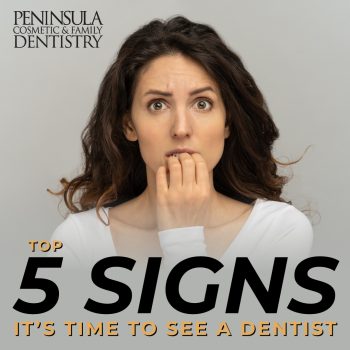Top 5 Signs It’s Time to See a Dentist
 Ignoring These Signs Can Cost You More Than Just Money
Ignoring These Signs Can Cost You More Than Just Money
Dental problems have a sneaky way of starting small and becoming serious. Many people wait until pain or discomfort becomes unbearable before seeking help, but by then, treatment is often more complex and costly. Knowing the early warning signs can help you take action sooner and keep your smile healthy for years to come.
Why Regular Dental Checkups Are Essential
Routine visits to your dentist allow for early detection and prevention. At Peninsula Cosmetic and Family Dentistry in Charleston, SC, we focus on helping you feel confident and comfortable about your oral health by catching problems before they escalate.
Sign #1: Persistent Tooth Pain or Sensitivity
A sudden jolt of pain when you drink something cold or bite down? That’s your body trying to get your attention.
When is Tooth Sensitivity a Problem?
Occasional sensitivity may be normal, but if it lingers or worsens, it could signal enamel erosion, tooth decay, or a cracked tooth.
Potential Causes of Tooth Pain
Persistent toothaches can stem from cavities, infections, abscesses, or even gum disease. A quick exam can determine the root cause and get you relief fast.
Sign #2: Bleeding, Swollen, or Red Gums
Healthy gums don’t bleed when you brush or floss. If yours do, it’s time to pay attention.
Understanding Gum Disease (Gingivitis & Periodontitis)
Gingivitis is the early stage of gum disease and is completely reversible. Left untreated, it can progress into periodontitis, a serious condition that can lead to tooth loss.
The Link Between Gum Health and Overall Health
Research shows a connection between gum disease and conditions like heart disease, stroke, and diabetes. Taking care of your gums means taking care of your whole body.
Sign #3: Chronic Bad Breath (Halitosis)
Bad breath can do more than make you self-conscious—it can indicate a deeper problem.
When Bad Breath Isn’t Just a Bad Day
If your breath doesn’t improve after brushing, flossing, or using mouthwash, it could be a sign of gum disease, tooth decay, or a bacterial infection.
How a Dentist Can Help with Halitosis
At Peninsula Cosmetic and Family Dentistry, we don’t just mask the odor—we identify and treat the underlying cause to restore your confidence and freshness.
Sign #4: Jaw Pain or Difficulty Chewing
Jaw tension or clicking when chewing may be more than stress-related.
TMJ Disorders and Their Impact
Temporomandibular joint (TMJ) disorders can cause jaw stiffness, headaches, neck pain, and difficulty eating. These issues often get worse without proper diagnosis and treatment.
What to Expect During a TMJ Evaluation
We’ll examine your bite, jaw movement, and muscle tenderness to determine the cause and create a treatment plan—often with conservative, non-invasive solutions.
Sign #5: Sores, Lumps, or Patches in Your Mouth
Any unusual spot that doesn’t heal after a couple of weeks should be evaluated by a professional.
The Importance of Oral Cancer Screenings
Oral cancer can be life-threatening if not caught early. That’s why we include a screening with every dental checkup.
When to Seek Immediate Dental Care
White or red patches, unexplained sores, or lumps should never be ignored. If you’re unsure, it’s better to get checked out than wait.
Don’t Ignore These Signs: Schedule Your Appointment at Peninsula Cosmetic and Family Dentistry Today!
Your mouth is constantly sending you signals—are you listening? Whether it’s pain, swelling, or something that just doesn’t feel right, getting ahead of dental issues can save you time, money, and discomfort.
Benefits of Choosing Our Charleston, SC Practice
At Peninsula Cosmetic and Family Dentistry, we combine advanced technology with compassionate care to create a comfortable, judgment-free experience. Whether you’re overdue for a checkup or experiencing symptoms, we’re here to help you feel at ease and in control of your oral health.
Contact Peninsula Cosmetic and Family Dentistry today to schedule an appointment!
Disclaimer: The content of this blog is not intended to be a substitute for professional medical advice, diagnosis, or treatment. Always seek the advice of qualified health providers with questions you may have regarding medical conditions.













